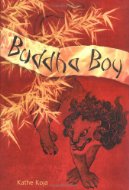[Book cover credit: librarything.com/work/91406]
Awards:
BCCB Blue Ribbon Book (2003)
Book Sense Summer Pick Teen Readers (2003)
ALA Best Books for Young Adults (2004)
ALA Popular Paperbacks for Young Adults - Religion: Relationship with the Divine (2007)
Booktalk:
"What is that?" from Megan in her usual drama-queen way: but it was a sight, really, this skinny bald-headed kid in a size million T-shirt, backpack humped and lumpy as a turtle's shell, making his way across the cafeteria like a rabbit crossing the freeway: this way, that way, looking all around. "An exchange student? From Mars?"But Jinsen is no alien. He's just a new kid with an outlook on life that differs from everyone else at Rucher High. Associating with Jinsen, quickly dubbed "Buddha Boy," would be social suicide, which is why Justin is dreading their new group assignment, the one that requires him to meet Jinsen at his house after school. But Justin and Jinsen have more in common than they think and, social suicide or not, Justin finds himself standing up for Jinsen, even when he won't stand up for himself.
p.5-6
Review:
Buddha Boy reminded me a lot of What Happened to Lani Garver. It has that same feeling of hurtling towards disaster running along in the backgroun of the whole thing. In the forefront, however, there is a great story about Jinsen and Justin. Jinsen seems not to care what anyone thinks of or does to him. Good thing, too, since he dresses, looks and acts odd, none of which gets him a bunch of friends. He practically invites kids to bully him when he starts to beg for lunch money in the cafeteria. Most of the kids do just that, either actively by throwing pennies or worse or passively by ignoring Jinsen altogether. Justin, instead, asks him why he's different.
The two boys have more in common than Justin had originally thought; they are both artists. Koja's use of language, especially when describing the boys' artwork, is beautiful. You can really see the works of art that Justin and Jinsen are creating as you're reading. Stemming from that, the rest of the book is simply lyrical. The story, even though it is set in a contemporary high school and deals with some pointedly cruel bullying, has the far away feel of a fairytale. Justin tells this story and it somehow manages to feel like it's happening in the present tense and like it's already happened at the same time. Regardless of the subject matter, it's beautiful. When you add Jinsen's attitude and actions, and the way he affects and changes Justin, the whole thing is really breathtaking.
I only had one complaint, and it's not exactly a deal-breaker. During the course of Justin and Jinsen's growing friendship, Jinsen explains a few things about Buddhism, but mostly smiles and lets Justin figure things out for himself. Jinsen lives by example. This is great and fits well with his reaction to the bullying in the story, but I did wish every once in a while that Jinsen would give a straight answer to Justin's questions. There doesn't seem to be a lot of young adult fiction dealing with Buddhism,* so it would have been nice for this one to be a bit more informative.
I loved Koja's writing and have since picked up a few of her adult books from the library just to get more of it (in addition to special ordering Under the Poppy).
Book source: Philly Free Library
*Or at least I couldn't find very many. I really wish librarything or goodreads allowed boolean searching...

No comments:
Post a Comment